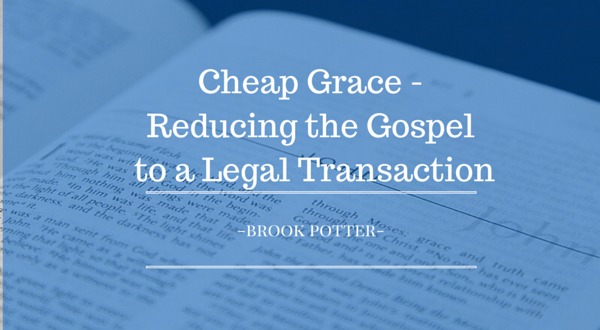By his Blood – Cheap Grace is when we reduce the Gospel to a Legal Transaction
“We cheapen God’s grace when we see it as a forensic fiction that gets us out of jail for free but doesn’t transform us out of our criminal character.” – Greg Boyd
Many years ago, before my awakening to the realities of the New Covenant, I heard a preacher talk about the atonement of Jesus Christ using Cookie Monster as an example. The story basically went that Cookie Monster had an uncontrollable urge to eat Cookies. One day, his Father bought some new cookies and told Cookie Monster not to eat the cookies, and left the house.
Not long into this story, the deep-seated urge for Cookie monster to eat cookies overcame him, and he ended up eating the cookies, at a moment just before his father returned. The father, seeing the cookie carnage, proceeds to ask, “Who ate the cookies?” In the tension of the story, Cookie monster’s brother steps forward and takes the blame for what Cookie Monster had done. To which the father beats his son as punishment for eating the cookies.
The moral of the story was that every time Cookie Monster would feel the urge to eat the cookies, he would remember the beating of his brother, and his love for his brother would keep him from giving into those uncontrollable urges. In many ways, this parallels the modern Penal Substitution view of the death of Christ, where humanity is Cookie Monster, his Brother is the Christ figure, and the Father represents God the Father.
This type of preaching is incorporated into many street evangelist techniques. It often takes the form of the “Good Person test,” that Ray Comfort and others have adopted to try and explain the Gospel to everyday people and explain their need for saving faith in Jesus Christ. While I can list off the many problems with this view such as, Jesus saves us from God, the punishment for the Law was physical death not hell, the Child Abuse behavior from the Father, the lack of any real forgiveness, or the breaking of unity in the Trinity between the Father and the Son, by far this view of the atonement is guilty of making light of sin, and reduces the Gospel to a “Get out of hell free” card.
Firstly, this version of the atonement reduces sin to something that we do, in this case, the breaking of the Law of Moses. According to this view, sin is not an inherit entity that invaded humanity in the garden of Eden before the Law and brought corruption to creation, instead sin is just bad behavior according to the Law. Even though Jesus made it clear that the sin of adultery could be committed with no actual action (Matthew 5:28).
Secondly, this version of the atonement makes light of the finished work of Jesus Christ. The Cross, in this view, has not done anything to transform humanity from the problem of indwelling sin, instead it just offers a way to avoid being punished for our bad behavior. To use Cookie Monster as the example, in this story there is nothing to control his “uncontrollable urges.” In essence, Cookie Monster’s desire for cookies hasn’t disappeared, he is now just motivated not to act on them. That’s not transformation, that’s behavior modification by will power.
Thirdly, it does not take people’s addictions and struggles with sin seriously. As a person who was addicted to pornography for many years, I can tell you, that all the love and attention in the world, did not help me stop watching porn. But this version of atonement suggests that I have the power to overcome these problem by myself, if only I had the right motivation. If only I can see how much Jesus loved me to take my punishment for me, then I’d have the will-power to stop sinning.
If the Cross of Jesus Christ has effectively accomplished no real change in humanity and only made a way for sinners to go to heaven, then you have cheapened the Cross and done away with the Forgiveness of God.
Now many people will object and start talking about God’s Justice! That because God is Holy, he MUST punish sin, otherwise he would not be a righteous Judge. To them, I simply say that Justice does not always take the form of punishment. There is another answer to God’s “demand” for Justice, that this view of the atonement destroys, that is the ways of Forgiveness.
God can punish sin or forgive sin, but he cannot do both.

